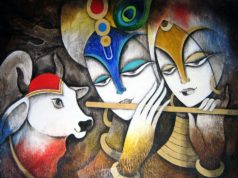Hanuman, the word means large jaws, is a monkey, an ardent devotee of Rama. He is also known as ‘Pavanputra’ which means the son of wind (pavan, vayu). His other names are ‘Anjaneya’ from Anjana, a female monkey, Vajra anga bali which means body as strong as diamond, Sankatmochan which means one who clears all troubles, Vir Hanuman which means one who has tremendous strength. Hanuman played a crucial role in Ramayana and stood beside Ram and Bharat to give a fight against Ravana and free Sita from the clutches of Ravana who had captured her. It is said, Hanuman had great strength that when Laxman, Ram’s brother was wounded, he brought the whole mountain of magical herbs ‘Sanjivani’ holding in his one hand to the battlefield. The idol of Hanuman is usually daubed orange with his common representation as his feet firmly planted apart with his mace aloft in one hand and the magical mountain in the other hand.
Hanuman is said to have freed the nine planets from Ravana’s hold. Mars and Saturn are the strongest and most important. It is said ‘Mangalvar’ (Tuesday) is sacred to mars. Mangal means auspicious and sacred to Hanuman. Devotees, therefore believe that by praying to Hanuman on Tuesday, the inauspicious effects of Mars are overcome as by freeing Mars, Hanuman had proved that he was the strongest of the two. ‘Shanivar’ (Saturday) is believed to be the day that belong to Shani (saturn) whose glare causes untold harm as it brings troubles all its way. Hence, to free oneself from troubles (sankat), devotees pray to Hanuman for the courage to fight against all odds and brush away their troubles.







